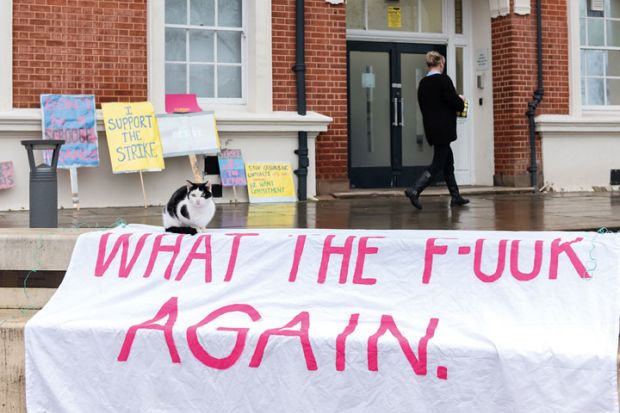UK higher education is “odds-on” for further industrial action over pensions, experts have said.
This comes after Universities UK (UUK) proposed making pensions less generous to forestall “unaffordable” increases in contributions to the Universities Superannuation Scheme (USS).
The proposals are aimed at preventing combined contributions from employers and staff rising from 30.7 per cent of salaries to between 42.1 per cent and 56.2 per cent in order to protect current benefits, as was set out in the most recent USS valuation.
Both UUK and unions have said this would be unaffordable for institutions and for staff, but a request by employers for a review of the valuation was rejected.
The UUK proposals include changing the accrual rate – the proportion of earnings received as a pension for each year in the scheme – to 1/85th of salary, instead of 1/75th of salary, and reducing the threshold for the defined benefit cut-off – which offers a guaranteed amount of pension – to £40,000.
However, the University and College Union (UCU) said these amounted to “unnecessary and damaging cuts” when the universities supporting the USS “could afford to take a more progressive approach”.
The union warned that its members were likely to vote for more industrial action if employers failed to make radical improvements to UUK’s initial proposals.
Sam Marsh, senior vice-president of the University of Sheffield’s UCU branch and a UCU national negotiator for the USS, said “what has been proposed by Universities UK is a non-solution to the ongoing crisis at the USS”.
“Vice-chancellors will be aware that this proposal will be odds-on to provoke industrial action. Perhaps worse, they will know that it would be unlikely to stand the test of time, just as has been the case with previous attempts at benefit reform,” he said.
The 2020 valuation was “the culmination of a misguided approach to scheme management that brings only a spiral of decline, unaffordable contribution increases and industrial strife”.
“There is a well-known crisis in governance at USS…It is time for [employers] to call it out, take steps to address it and find a long-term solution to the scheme,” he said.
Roger Seifert, emeritus professor of human resource management and industrial relations at the University of Wolverhampton Business School, agreed that industrial action was on the cards. Both sides will become “entrenched”, as employers face financial uncertainty in the wake of student number fragilities and concern over research funding post-Brexit, while staff are “more worried than ever about their futures in terms of secure, long-term employment, workload, promotion pathways and research opportunities”.
“Any way forward would require the employers to be more united and clearer as to the medium-term future of the sector,” he said.
A spokesperson for UUK said: “It is easy to simply oppose change, but reform is necessary to tackle the scheme’s funding gap and ensure that USS pensions are affordable for members and employers. We would welcome and be keen to examine alternative proposals from the UCU.”
后记
Print headline: More UK strike action over pensions ‘odds-on’
